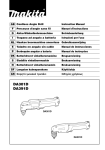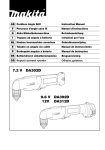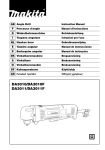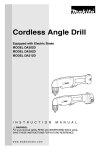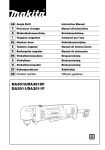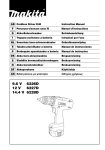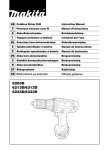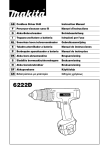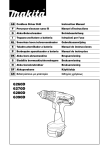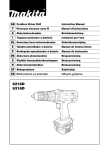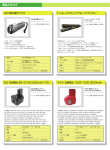Download Makita DA312D Instruction manual
Transcript
GB Cordless Angle Drill Instruction Manual F Perceuse d’angle sans fil Manuel d’instructions D Akku-Winkelbohrmaschine Betriebsanleitung I Trapano ad angolo a betteria Istruzioni per l’uso NL Haakse boormachine snoerloze Gebruiksaanwijzing E Taladro en ángulo sin cable Manual de instrucciones P Berbequim angular a bateria Manual de instruções DK Batteridrevet vinkelboremaskine Brugsanvisning S Sladdlös vinkelborrmaskin Bruksanvisning N Batteridrevet vinkelboremaskin Bruksanvisning SF Langaton kulmaporakone Käyttöohje GR Φορητ γωνιακ τρυπάνι Οδηγίες χρήσεως 7.2 V DA 302D 9.6 V 12V DA392D DA312D 3 1 2 2 1 2 4 6 8 5 7 3 4 10 5 6 11 1 7 2 9 ENGLISH Explanation of general view 1 2 3 4 Set plate Battery cartridge Button Sleeve 5 6 7 8 Ring Reversing switch lever Switch trigger B side 9 A side 10 Restart button 11 Screw SPECIFICATIONS Model DA302D Capacities Steel ........................................................... 10 mm Wood .......................................................... 10 mm Wood screw ................................................ 4.5 mm x 20 mm No load speed (min-1) .................................... 0 – 800 Overall length ................................................ 296 mm Net weight ...................................................... 1.1 kg Rated voltage ................................................ D.C. 7.2 V DA392D DA312D 10 mm 12 mm 4.5 mm x 20 mm 0 – 800 324 mm 1.3 kg D.C. 9.6 V 10 mm 12 mm 4.5 mm x 20 mm 0 – 800 324 mm 1.4 kg D.C. 12 V • Due to our continuing program of research and development, the specifications herein are subject to change without notice. • Note: Specifications may differ from country to country. 8. Intended use The tool is intended for drilling in wood, metal and plastic. SAVE THESE INSTRUCTIONS. Safety hints For your own safety, please refer to the enclosed safety instructions. Tips for maintaining maximum battery life IMPORTANT SAFETY INSTRUCTIONS FOR CHARGER & BATTERY CARTRIDGE ENC004-1 1. 2. 3. 4. 5. 6. 7. Before using battery cartridge, read all instructions and cautionary markings on (1) battery charger, (2) battery, and (3) product using battery. Do not disassemble battery cartridge. If operating time has become excessively shorter, stop operating immediately. It may result in a risk of overheating, possible burns and even an explosion. If electrolyte gets into your eyes, rinse them out with clear water and seek medical attention right away. It may result in loss of your eyesight. Always cover the battery terminals with the battery cover when the battery cartridge is not used. Do not short the battery cartridge: (1) Do not touch the terminals with any conductive material. (2) Avoid storing battery cartridge in a container with other metal objects such as nails, coins, etc. (3) Do not expose battery cartridge to water or rain. A battery short can cause a large current flow, overheating, possible burns and even a breakdown. Do not store the tool and battery cartridge in locations where the temperature may reach or exceed 50°C (122°F). 9. 1. 2. 3. 4. Do not incinerate the battery cartridge even if it is severely damaged or is completely worn out. The battery cartridge can explode in a fire. Be careful not to drop or strike battery. Charge the battery cartridge before completely discharged. Always stop tool operation and charge the battery cartridge when you notice less tool power. Never recharge a fully charged battery cartridge. Overcharging shortens the battery service life. Charge the battery cartridge with room temperature at 10°C – 40°C (50°F – 104°F). Let a hot battery cartridge cool down before charging it. Charge the Nickel Metal Hydride battery cartridge when you do not use it for more than six months. ADDITIONAL SAFETY RULES ENB022-1 1. 2. 3. 4. 5. 6. 7. 8. Be aware that this tool is always in an operating condition, because it does not have to be plugged into an electrical outlet. Hold tool by insulated gripping surfaces when performing an operation where the cutting tool may contact hidden wiring. Contact with a “live” wire will also make exposed metal parts of the tool “live” and shock the operator. Always be sure you have a firm footing. Be sure no one is below when using the tool in high locations. Hold the tool firmly. Keep hands away from rotating parts. Do not leave the tool running. Operate the tool only when hand-held. Do not touch the drill bit or the workpiece immediately after operation; they may be extremely hot and could burn your skin. SAVE THESE INSTRUCTIONS. 3 OPERATING INSTRUCTIONS Reversing switch action (Fig. 4) Installing or removing battery cartridge CAUTION: • Always check the direction of rotation before operation. • Use the reversing switch only after the tool comes to a complete stop. Changing the direction of rotation before the tool stops may damage the tool. • When not operating the tool, always set the reversing switch lever to the neutral position. For DA302D (Fig. 1) • Always switch off the tool before insertion or removal of the battery cartridge. • To remove the battery cartridge, pull out the set plate on the tool and grasp both sides of the cartridge while withdrawing it from the tool. • To insert the battery cartridge, align the tongue on the battery cartridge with the groove in the housing and slip it into place. Snap the set plate back into place. Be sure to close the set plate fully before using the tool to prevent the battery cartridge from accidentally falling out of the tool. • Do not use force when inserting the battery cartridge. If the cartridge does not slide in easily, it is not being inserted correctly. For DA392D & DA312D (Fig. 2) • Always switch off the tool before insertion or removal of the battery cartridge. • To remove the battery cartridge, withdraw it from the tool while pressing the push buttons on both sides of the cartridge. • To insert the battery cartridge, align the tongue on the battery cartridge with the groove in the housing and slip it into place. Always insert it all the way until it locks in place with a little click. If not, it may accidentally fall out of the tool, causing injury to you or someone around you. • Do not use force when inserting the battery cartridge. If the cartridge does not slide in easily, it is not being inserted correctly. Installing or removing driver bit or drill bit (Fig. 3) CAUTION: Always be sure that the tool is switched off and the battery cartridge is removed before installing or removing the bit. Hold the ring and turn the sleeve counterclockwise to open the chuck jaws. Place the bit in the chuck as far as it will go. Hold the ring firmly and turn the sleeve clockwise to tighten the chuck. To remove the bit, hold the ring and turn the sleeve counterclockwise. Switch action (Fig. 4) CAUTION: Before inserting the battery cartridge into the tool, always check to see that the switch trigger actuates properly and returns to the “OFF” position when released. To start the tool, simply pull the trigger. Tool speed is increased by increasing pressure on the trigger. Release the trigger to stop. 4 This tool has a reversing switch to change the direction of rotation. Set the reversing switch lever to the A side for clockwise rotation or to the B side for counterclockwise rotation. When the reversing switch lever is in the neutral position, the tool will not start even if you pull the trigger. Overload protector (Fig. 5) The overload protector automatically cuts out to break the circuit and the button pops out, whenever heavy work is prolonged. Wait 20 – 30 seconds before pressing the restart button to resume operation. Your finger should not be on the switch trigger when you press the restart button, however. Drilling operation • Drilling in wood When drilling in wood, best results are obtained with wood drills equipped with a guide screw. The guide screw makes drilling easier by pulling the bit into the workpiece. • Drilling in metal To prevent the bit from slipping when starting a hole, make an indentation with a center punch and hammer at the point to be drilled. Place the point of the bit in the indentation and start drilling. Use a cutting lubricant when drilling metals. The exceptions are iron and brass which should be drilled dry. CAUTION: • Pressing excessively on the tool will not speed up the drilling. In fact, this excessive pressure will only serve to damage the tip of your bit, decrease the tool performance and shorten the service life of the tool. • There is a tremendous twisting force exerted on the tool/bit at the time of hole breakthrough. Hold the tool firmly and exert care when the bit begins to break through the workpiece. Use both hands to help control the tool. • A stuck bit can be removed simply by setting the reversing switch to reverse rotation in order to back out. However, the tool may back out abruptly if you do not hold it firmly. • Always secure small workpieces in a vise or similar hold-down device. MAINTENANCE Screwdriving operation (Fig. 6) Place the point of the driver bit in the screw head and apply pressure to the tool. Start the tool slowly and then increase the speed gradually. Release the trigger just as the screw bottoms out. If the trigger is not released, the screw may strip out the hole or the screw and/or bit may be damaged. NOTE: • Make sure that the driver bit is inserted straight in the screw head, or the screw and/or bit may be damaged. • When driving wood screws, predrill pilot holes to make driving easier and to prevent splitting of the workpiece. See the chart. • If the tool is operated continuously until the battery cartridge has discharged, allow the tool to rest for 15 minutes before proceeding with a fresh battery. Nominal diameter of wood screw (mm) Recommended size of pilot hole (mm) 3.1 2.0 – 2.2 3.5 2.2 – 2.5 3.8 2.5 – 2.8 4.5 2.9 – 3.2 CAUTION: Always be sure that the tool is switched off and the battery cartridge is removed before carrying out any work on the tool. To maintain product safety and reliability, repairs, maintenance or adjustment should be carried out by a Makita Authorized Service Center. ACCESSORIES CAUTION: • These accessories or attachments are recommended for use with your Makita tool specified in this manual. The use of any other accessories or attachments might present a risk of injury to persons. Only use accessory or attachment for its stated purpose. If you need any assistance for more details regarding these accessories, ask your local Makita service center. • • • • • • Screw bits Rubber pad assembly Foam polishing pad 125 Wool bonnet 100 Various type of Makita genuine batteries and chargers Plastic carrying case Installing set plate (Optional accessory) (Fig. 7) Always install the set plate when using battery cartridges 9100, 9102, 9102A for Model DA392D and 1200, 1202, 1200A, 1202A for Model DA312D. Install the set plate on the tool with the screw provided. 5 NEDERLANDS Verklaring van algemene gegevens 1 2 3 4 Het klemplaatje Batterij Knop Bus 5 6 7 8 Ring Omkeerschakelaar Trekschakelaar Zijde B TECHNISCHE GEGEVENS Model DA302D Capaciteit Staal ........................................................... 10 mm Hout ............................................................ 10 mm Houtschroeven ............................................ 4,5 mm x 20 mm Toerental onbelast (min-1) ............................. 0 – 800 Totale lengte .................................................. 296 mm Netto gewicht ................................................. 1,1 kg Nominale spanning ........................................ DC 7,2 V • In verband met ononderbroken research en ontwikkeling behouden wij ons het recht voor bovenstaande technische gegevens te wijzigen zonder voorafgaande kennisgeving. • Opmerking: De technische gegevens kunnen van land tot land verschillen. 7. Doeleinden van gebruik Dit gereedschap is bedoeld voor het boren in hout, metaal en plastic. 9. 8. 9 Zijde A 10 Herstarttoets 11 Schroef DA392D DA312D 10 mm 12 mm 4,5 mm x 20 mm 0 – 800 324 mm 1,3 kg DC 9,6 V 10 mm 12 mm 4,5 mm x 20 mm 0 – 800 324 mm 1,4 kg DC 12 V Bewaar het gereedschap en de accu niet op plaatsen waar de temperatuur kan oplopen tot 50°C of hoger. Werp de accu nooit in het vuur, ook niet wanneer hij zwaar beschadigd of volledig versleten is. De accu kan namelijk ontploffen in het vuur. Wees voorzichtig dat u de accu niet laat vallen en hem niet blootstelt aan schokken of stoten. BEWAAR DEZE VOORSCHRIFTEN. Veiligheidswenken Voor uw veiligheid dient u de bijgevoegde Veiligheidsvoorschriften nauwkeurig op te volgen. Tips voor een maximale levensduur van de accu BELANGRIJKE VEILIGHEIDSVOORSCHRIFTEN VOOR ACCULADER EN ACCU 2. 1. 2. 3. 4. 5. 6. Lees alle voorschriften en waarschuwingen op (1) de acculader, (2) de accu, en (3) het product waarvoor de accu wordt gebruikt, aandachtig door alvorens de acculader in gebruik te nemen. Neem de accu niet uit elkaar. Als de gebruikstijd van een opgeladen accu aanzienlijk korter is geworden, moet u het gebruik ervan onmiddellijk stopzetten. Voortgezet gebruik kan oververhitting, brandwonden en zelfs een ontploffing veroorzaken. Als er elektrolyt in uw ogen is terechtgekomen, spoel dan uw ogen met schoon water en roep onmiddellijk de hulp van een dokter in. Elektrolyt in de ogen kan blindheid veroorzaken. Bedek de accuklemmen altijd met de accukap wanneer u de accu niet gebruikt. Voorkom kortsluiting van de accu: (1) Raak de accuklemmen nooit aan met een geleidend materiaal. (2) Bewaar de accu niet in een bak waarin andere metalen voorwerpen zoals spijkers, munten e.d. worden bewaard. (3) Stel de accu niet bloot aan water of regen. Kortsluiting van de accu kan oorzaak zijn van een grote stroomafgifte, oververhitting, brandwonden, en zelfs defecten. 1. 3. 4. Laad de accu op voordat hij volledig ontladen is. Stop het gebruik van het gereedschap en laad de accu op telkens wanneer u vaststelt dat het vermogen van het gereedschap is afgenomen. Laad een volledig opgeladen accu nooit opnieuw op. Als u de accu te veel oplaadt, zal hij minder lang meegaan. Laad de accu op bij een kamertemperatuur tussen 10°C en 40°C. Laat een warme accu afkoelen alvorens hem op te laden. Laad de nikkel-metaalhydride accu op telkens wanneer u hem langer dan zes maanden niet hebt gebruikt. AANVULLENDE VEILIGHEIDSVOORSCHRIFTEN VOOR HET GEREEDSCHAP 1. 2. 3. 4. Denk eraan dat dit gereedschap altijd gebruiksklaar is, omdat het niet op een stopcontact hoeft te worden aangesloten. Houd het gereedschap bij de geïsoleerde handgrepen vast wanneer u boort op plaatsen waar het gereedschap met verborgen elektrische bedrading in aanraking kan komen. Door contact met een onder spanning staande draad, zullen ook de niet-geïsoleerde metalen delen van het gereedschap onder spanning komen te staan en zal de gebruiker een elektrische schok krijgen. Zorg ervoor dat u altijd stevige steun voor de voeten hebt. Controleer of er zich niemand beneden bevindt wanneer u het gereedschap op een hoge plaats gaat gebruiken. 15 5. 6. 7. 8. Houd het gereedschap stevig vast. Houd uw handen uit de buurt van roterende onderdelen. Laat het gereedschap niet achter terwijl het nog in bedrijf is. Bedien het gereedschap alleen wanneer u het met de handen vasthoudt. Raak de boor of het werkstuk niet aan onmiddellijk na het gebruik; deze kunnen erg heet zijn en brandwonden veroorzaken. BEWAAR DEZE VOORSCHRIFTEN. BEDIENINGSVOORSCHRIFTEN Plaatsen en uithalen van batterij Voor DA302D (Fig. 1) • Schakel het gereedschap altijd uit voordat de accu geplaatst of verwijderd wordt. • Om de accu te verwijderen, trek eerst het klemplaatje uit het gereedschap, pak dan de accu aan beide zijden vast en verwijder het uit het gereedschap. • Voor het plaatsen van de accu zorgt u ervoor dat de rug op de accu in de groef van het accucompartiment komt, waarna u de accu naar binnen schuift. Zorg dat het klemplaatje goed gesloten is voordat u het gereedschap gebruikt, om te voorkomen dat de accu per ongeluk uit het gereedschap valt. • Als de accu moeilijk in de houder komt, probeer het dan niet met geweld erin te duwen. Indien de accu er niet gemakkelijk ingaat, dan houdt u het verkeerd om. Voor DA392D en DA312D (Fig. 2) • Schakel het gereedschap altijd uit alvorens de accu te installeren of te verwijderen. • Om de accu te verwijderen, neemt u deze uit het gereedschap terwijl u de knoppen aan beide zijden van de accu indrukt. • Om de accu te installeren, past u de tong op de accu in de groef in de houder, en dan schuift u de accu erin. Schuif de accu zo ver mogelijk erin, totdat deze met een klikgeluid vergrendelt. Indien u dit niet doet, kan de accu per ongeluk uit het gereedschap vallen en uzelf of anderen verwonden. • Als de accu moeilijk in de houder gaat, moet u niet proberen hem met geweld erin te duwen. Indien de accu er niet gemakkelijk ingaat, betekent dit dat u hem niet op de juiste wijze erin steekt. Installeren of verwijderen een boor of schroefbit (Fig. 3) LET OP: Controleer altijd of het gereedschap is uitgeschakeld en de accu is verwijderd alvorens de boor te installeren of te verwijderen. Houd de ring vast en draai de bus naar links om de klauwen van de boorkop te openen. Steek de boor zo ver mogelijk in de boorkop. Houd daarna de ring weer stevig vast en draai de bus naar rechts om de boorkop vast te zetten. Om de boor te verwijderen, houdt u de ring vast en draait u de bus naar links. 16 Werking van de trekschakelaar (Fig. 4) LET OP: Alvorens de accu in het gereedschap te plaatsen, moet u altijd controleren of de trekschakelaar juist werkt en bij het loslaten naar de “OFF” positie terugkeert. Om het gereedschap in te schakelen, drukt u gewoon de trekschakelaar in. Hoe dieper de trekschakelaar wordt ingedrukt, hoe sneller het gereedschap draait. Om het gereedschap uit te schakelen, de trekschakelaar loslaten. Werking van de omkeerschakelaar (Fig. 4) LET OP: • Controleer altijd de draairichting alvorens het gereedschap te gebruiken. • Verander de stand van de omkeerschakelaar alleen nadat het gereedschap volledig tot stilstand is gekomen. Indien u de draairichting verandert terwijl de boor nog draait, kan het gereedschap beschadigd raken. • Zet de omkeerschakelaar altijd in de neutrale stand wanneer u het gereedschap niet gebruikt. Dit gereedschap heeft een omkeerschakelaar voor het veranderen van de draairichting. Druk de omkeerschakelaar in vanaf zijde A voor rechtse draairichting, of vanaf zijde B voor linkse draairichting. Dit gereedschap heeft een omkeerschakelaar voor het veranderen van de draairichting. Schuif de omkeerschakelaar naar de “A” zijde voor rechtse draairichting of naar de “B” zijde voor linkse draairichting. Wanneer de omkeerschakelaar in de neutrale stand staat, zal het gereedschap niet starten ook al drukt u de trekschakelaar in. Bescherming tegen overbelasting (Fig. 5) Het mechanisme ter bescherming tegen overbelasting schakelt de stroom automatisch uit, waneer het gereedschap te lang wordt overbelast. De toets springt daarbij te voorschijn. Wacht 20 – 30 sekonden, alvorens de herstarttoets in te drukken voor het hervatten van het werk. Druk echter niet op de trekschakelaar, wanneer u de herstarttoets indrukt. Normaal boren • Boren in hout Voor boren in hout worden de beste resultaten verkregen met houtboren die voorzien zijn van een geleideschroef. Het boren wordt dan vergemakkelijkt aangezien de geleideschroef de boor in het hout trekt. • Boren in metaal Wanneer u begint te boren, gebeurt het dikwijls dat de boor slipt. Om dit te voorkomen slaat u van tevoren met een drevel een deukje in het metaal op de plaats waar u wilt boren. Plaats vervolgens de boor in het deukje en start het boren. Gebruik altijd boorolie wanneer u in metaal boort. De enige uitzonderingen zijn ijzer en koper die “droog” geboord dienen te worden. LET OP: • Door teveel druk op het gereedschap uit te oefenen verloopt het boren niet sneller. Integendeel, teveel druk op het gereedschap zal alleen maar de boor beschadigen, de prestatie van het gereedschap verminderen en de gebruiksduur verkorten. • Er ontstaan enorme spanningen op het ogenblik dat de boor uit het gaatje tevoorschijn komt. Houd derhalve het gereedschap stevig vast en wees op uw hoede. Gebruik beide handen om het gereedschap onder controle te houden. • Wanneer de boor klemraakt, keert u met de omkeerschakelaar de draairichting om, om de boor uit het gaatje te krijgen. Het gereedschap kan echter plotseling terugspringen wanneer u het niet stevig vasthoudt. • Kleine werkstukken dient u altijd eerst vast te zetten met een klemschroef of iets dergelijks. Indraaien van schroeven (Fig. 6) Plaats de bit op de schroefkop en oefen druk op het gereedschap uit. Start eerst met lage snelheid en voer deze vervolgens geleidelijk op. Laat de trekschakelaar los als de schroef volledig is ingedraaid. Indien u dit nalaat, krijgt u een lelijk gat en kan de schroef en/of de schroefbit beschadigd worden. OPMERKING: • Zorg dat u de schroefbit recht op de schroefkop plaatst, aangezien anders de schroef en/of de schroefbit beschadigd kan worden. • Wanneer u houtschroeven indraait, maak van tevoren een gaatje in het hout. Dit vergemakkelijkt het vastschroeven en voorkomt dat het hout splijt. Zie de tabel. • Indien het gereedschap ononderbroken wordt gebruikt totdat de accu is ontladen, dient u het gereedschap 15 minuten te laten rusten alvorens met een nieuwe accu verder te werken. Nominale diameter van houtschroef (mm) Aanbevolen diameter voorboren (mm) 3,1 2,0 – 2,2 3,5 2,2 – 2,5 3,8 2,5 – 2,8 4,5 2,9 – 3,2 ONDERHOUD LET OP: Controleer altijd of het gereedschap is uitgeschakeld en de accu is losgekoppeld vooraleer werken uit te voeren aan de machine. Opdat het gereedschap veilig en betrouwbaar blijft, dienen alle reparaties, onderhoud of afstellingen te worden uitgevoerd bij een erkend Makita service centrum. ACCESSOIRES LET OP: • Deze accessoires of hulpstukken worden aanbevolen voor gebruik met het Makita gereedschap dat in deze gebruiksaanwijzing is beschreven. Bij gebruik van andere accessoires of hulpstukken bestaat er gevaar voor persoonlijke verwonding. Gebruik de accessoires of hulpstukken uitsluitend voor hun bestemde doel. Raadpleeg het dichtstbijzijnde Makita Servicecentrum voor verder advies of bijzonderheden omtrent deze accessoires. • • • • • • Schroefbits Rubber steunschijf set Schuimrubber polijstkussen 125 Wollen poetsschijf 100 Diverse types originele Makita accu’s en acculaders Plastic draagkoffer Installeren van het klemplaatje (Los verkrijgbaar accessoire) (Fig. 7) Installeer altijd het klemplaatje wanneer u accu’s 9100, 9102, 9102A voor Model DA392D en 1200, 1202, 1200A, 1202A voor Model DA312D gebruikt. Monteer het klemplaatje door middel van de bijgeleverde schroef op het gereedschap. 17
This document in other languages
- Nederlands: Makita DA312D








